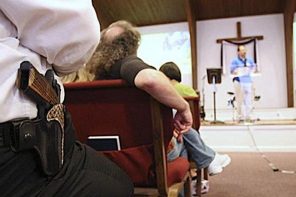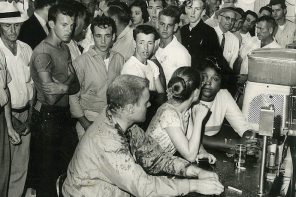On the occasion—or rather double-occasion—of Martin Luther King Jr. Day and the presidential inauguration of Barack Obama, Religion Dispatches contributor and editor-at-large Jonathan Walton has curated a selection of perspectives—on the perils of history, the lure of symbolism, the promise of the future, and the meaning of race and religion in America.
We have borrowed the name of today’s e-anthology from Edward Blum’s contribution, in which he reminds us of the words of W.E.B. DuBois, who called on Americans to “Awake, awake!” This double message—a profound faith in Dr. King’s dream, coupled with an urgent wish for us to awaken, both as a people and as a polity—is the thread that runs through all of these short essays.
And now, to introduce the series, a message from Professor Walton:
There is a mood of civil rights sentimentality in the air, and with it, a strong desire to connect Martin Luther King Jr. and President Barack Obama, both historically and thematically. Melodramatic media talking points linking the King holiday and the inauguration are sure to contribute to this public mood.
This is why we have gathered the critical reflections and insights of a group of scholars of religion from varying fields to lend their voices on this momentous occasion. Neither ahistorical homilies nor polarizing polemics, this collection of short pieces from religious historians, philosophers, and ethicists attempts to acknowledge the importance of Tuesday’s presidential inauguration while keeping track of the political realities that Dr. King lived and died for.
These are precarious times. Wars are being fought on multiple fronts even as we celebrate Dr. King’s philosophy of nonviolence; President Obama is trying to construct a plan to bail out both Wall Street and Main Street, even as, in contrast to King, very little attention is being paid to those who live on the backstreet. And we celebrate a president who was elected based on the content of his character, just as we must acknowledge that underperforming schools, home foreclosures, and record incarceration rates are disproportionately influenced by the color of one’s skin.
For this reason, if there is a theme that runs through these writings it is one of sober celebration for President Obama’s place in American history along with a strong focus on Martin Luther King’s continued prophetic challenge for our nation.
Rather than viewing Tuesday’s inauguration of President Obama as a “dream fulfilled,” many interpret his victory, more cautiously, as an occasion for hope.
Enjoy!
_____________________________________________________________
From Yes We Can to Yes, We Did! by Anthea Butler
If King could have conceived of this day, with the coincidence of a holiday in his honor and the swearing-in of the first president of African descent, he would surely have marveled. And then he would have set us all to work.
Awake from Dreaming: Forecasts and Fears of the Next Four Years by Edward J. Blum
King’s reputation and influence suffered in the four years after his famous “I have a dream” speech. Even Obama, who rides high on a tide of popularity, is not immune to the vagaries of history.
Obama and King: History in Motion by Leslie D. Callahan
King and Obama have in common a confidence that people can be moved to do something different. King gave his life to and for that confidence. He was not the first, and Obama is not the last.
King and Obama—Don’t Get it Twisted by William Hart
There is a temptation to regard Obama’s inauguration as the end of a forty-year “wilderness” experience, but symbolism and symmetry can only take us so far. We, as citizens, are going to need to hold Obama accountable.
Post-Racial? Yes and No by Alice Hunt
In the journey toward white comprehension of the legacy of racism, consciousness comes slowly. But now is the time for the hard work, the time for what Dr. King called “creative action.”
Power, The Presidency, and Social Change by June O’Connor
Barack Obama has proven himself a keen thinker, a good organizer, and a person with a moral sensibility that bends toward justice. But what happens to a community organizer from Chicago when he becomes president?
We Are All God’s Got by Emilie Townes
We no longer have the focus of the civil rights movement or of the great leaders of that time, but we are called, nonetheless, to change our world.




